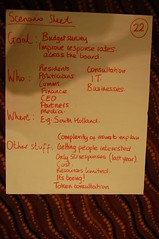At the introduction to digital engagement workshop we ran this week, I debuted the digital engagement game.
It’s a workshop exercise that’s an expansion of my version of David Wilcox‘s social media game, which in turn has been developed into the Social by Social game.
The original game featured a pack of cards detailing various social media tools, and a few traditional ones too. Teams then came up with scenarios, and used the cards to produce solutions.
It was always good fun to run and is helpful in getting people to focus on purpose and not getting hung up on the tools.
Over time though it became clear that the cards needed updating, and if we were going to do that, then we might as well revisit the whole thing.
So, now there are four different sets of cards in the game. These hopefully cover the range of issues people planning digital engagement projects need to consider.
Tools – the technology
- Blogging
- Social networks
- Status updates
- Media sharing
- Online collaboration
- Newsletters
- Aggregation
- Social authoring
- Web conferencing
- Mobile apps
- Location services
Roles – the people
- Champion
- Community manager
- Digital mentor
- Moderator
- Social reporter
- Developer
- Strategist
- Data expert
- Evangelist
- Content wizard
Activities – the other stuff you have to do
- Training
- Events
- Workshops
- Social media surgeries
- Network mapping
- Codesign
- Listening online
- Evaluation
- Publish open data
- Carry out surveys
Process – tackling the bureaucracy
- Develop strategy
- Write policy
- Campaign plans
- Project management
- Identify the keen
- Make business case
- Get IT support
- Get political buy-in
- Get senior managers on board
- Manage risks
Teams in the game have two sheets, one to set the scenario:

And one to plot the solution:

This format of the game seems to work pretty well, helping people think about all the issues involved in solving problems using digital tools – especially the idea that the people and the process matter just as much, if not more, than the technology.
If you’d like to make your own set of cards, here’s the PDF (3.1mb) which you can print out, cut up, fold and laminate.


